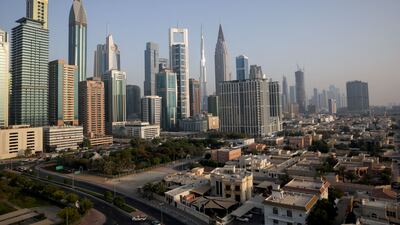Dubai is expected to continue attracting foreign direct investment, despite global economic challenges, as it benefits from its position as a trade centre and its business-friendly policies, a report has said.
“Amidst the global headwinds of uncertainty, high inflation and diminishing liquidity, the task of luring FDI is a huge challenge,” Mayed Alrashdi, an Emirates NBD economist, said in the report.
“However, Dubai is well positioned to remain an attractive proposition for FDI inflows, thanks to its strategic location as a crossroad for major trade routes, favourable tax rates, strong policies and institutions, and recent robust economic growth.”
Emirates NBD economist
This comes after Dubai's FDI inflows rose by 80 per cent annually to Dh47 billion ($12.8 billion) in 2022, according to recent data by DubaiFDI, a division of the emirate's Department of Economy and Tourism.
While the value of FDI inflows last year is 47 per cent higher than the annual average inflow over the past decade, it remains 28 per cent below the pre-coronavirus peak of Dh65.8 billion in 2019, Emirates NBD said.
The number of announced FDI projects hit a record in 2022, rising by 89 per cent annually to 619, according to the bank's report.

The US was the largest source of FDI projects in 2022, with 235 projects, followed by the UK (152), India (141), France (49) and Switzerland (47).
The top source country for FDI capital to Dubai was Canada, which accounted for 41 per cent of the total value of investment flows.
Canada's debut appearance in the top five sources of FDI capital was driven by merger and acquisition activity as pension fund Caisse de Depot et Placement du Quebec (CDPQ) acquired a 22 per cent stake worth Dh18.4 billion in three Dubai-based assets through a joint venture with DP World.
The UK accounted for 12 per cent of FDI capital, followed by the US (11 per cent), India (4 per cent) and Switzerland (4 per cent).

Under the Dubai Economic Agenda D33 strategy, the emirate aims to double its gross domestic product to Dh800 billion by 2033.
FDI is a key driver of the goal, with inflows expected to rise to Dh60 billion a year between 2023 and 2033, from the annual average of Dh32 billion recorded in the previous 10 years.
FDI is key to the emirate’s ambitions because it drives economic growth through capital accumulation, job creation, the adoption of new technology and increased productivity, Emirates NBD said.

Last year, Dubai was ranked seventh globally in terms of greenfield FDI value and No 1 worldwide in terms of the number of projects, with 837 greenfield initiatives, according to the 2022 Financial Times fDi Markets report.
It came ahead of financial centres such as Singapore and London, which had 481 and 411 greenfield FDI projects, respectively.
Dubai’s economy expanded by 4.6 per cent on an annual basis in the first nine months of 2022, with retail trade accounting for 24.1 per cent of its GDP, according to data from the emirate's statistics centre.
Emirates NBD estimates Dubai's full-year growth for 2022 at 5 per cent and expects its GDP to expand by 3.5 per cent this year.


